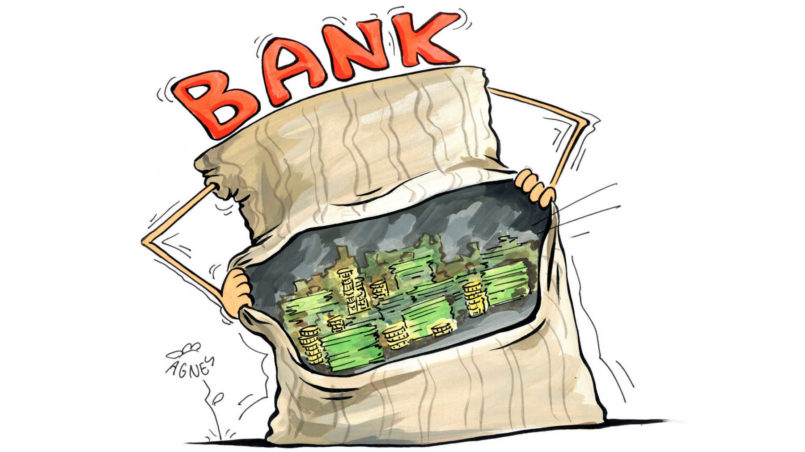The Unconditional Basic Income: How can it be achieved?

In the first part of my series of articles on the Unconditional Basic Income (UBI), I explained the basic idea of the UBI and why it seems more than ever necessary and highly desirable to many. But what is this supposed to look like in practice?
The idea of the UBI is based on the assumption that all people should receive a fixed monthly amount, which is so high that it enables them to lead a modest lifestyle. But where does the money come from? After all, the financing of traditional social benefits (which are only paid out to a part of the population) is already a problem. At first glance, it seems as if there is simply “no money” for a UBI. But the protagonists have some ideas!
Any claim must, therefore, be scrutinized meticulously, possibly existing private assets are actually confiscated, and even spouses and partners are held liable for the unemployed with their own income. All this must be managed: authorities make considerable efforts to ensure that no-one collects social benefits that they would not be entitled to.
In contrast, the UBI would be “unconditional” and would automatically be paid out to everyone. According to this idea, it is intended to replace all of today’s social transfers – unemployment benefits, basic social security provision, family allowances, and, according to some considerations even pensions. The necessary bureaucracy would, therefore, be completely eliminated, and this alone would free up considerable resources.
Intermediate question: How high should the UBI actually be?
The protagonists seem to be a little depressed by this question, and the determination of a concrete level is to be left to later political discussions. There is only agreement that it should be “livelihood-securing”, i. e. not too low – figures of 1,000 to 1,500 Euro per month are mentioned as a basis for discussion. Incidentally, a UBI is also to be paid for children, albeit possibly in smaller amounts than for adults.
That is an astonishing amount, but it is not enough. There are various ideas for financing the remaining portion: Straubhaar, for example, would like to greatly increase income-based taxes, which the UBI wants to make possible in a socially responsible manner. He proposes an income tax that is to be a flat tax regardless of the income level (the UBI remains tax-free). According to his simple and Germany-based model calculation in “Radikal gerecht”, a tax rate of 40 % would then suffice to finance a UBI of 1,000 Euro per month.
Götz W. Werner proposes a far more radical model for financing in “Einkommen für alle” (“Income for All”): accordingly, all taxes on gainful employment (i. e. wage and income tax), as well as all profit-based corporate taxes, should be abolished. In return, the value added tax should be increased significantly. Labour would thus become cheaper and goods and services considerably more expensive. On the other hand, the elimination of the high non-wage labour costs would make human labour far more affordable than it is today so that many new jobs would be created and most people would have a double income from a UBI and salary to compensate for the higher consumer prices.
In the current discussion, however, this model of exclusive financing via consumer taxation now seems to be a marginal view. Most other proponents of the UBI would in principle like to maintain and simply adapt the current tax system, which is essentially based on the taxation of personal income and corporate profits. The “Basic Income Network” provides an overview of the proposed financing models.
The UBI is supposed to be enough to sustain life, which means that one could “make a living” and do without any kind of employment. The idealists among the proponents do not doubt that these people exist, but they are sure that there would remain isolated cases. The skeptics, on the other hand, point out that people tend to be self-serving in principle and that if a certain amount of pressure were to cease, they would hardly pursue economically meaningful activities.
The effects on wage developments are also unpredictable: the loss of the current need for work would force employers to make their job offers more attractive, the protagonists say. Unattractive work would have to be paid considerably more than before so that people would still find themselves willing to empty garbage cans or clean toilets. On the other hand, work which requires more highly qualified individuals, but which is fulfilling and personally meaningful, could possibly be paid less. Advocates argue that this would create a genuine labour market in which sought-after jobs would be paid less and not so sought-after more.
Critics also argue that wages would probably fall rapidly because people would no longer have to secure their livelihoods and that the UBI would thus be a hidden subsidy to companies. I guess it’s not that simple after all.
Read more in the third part of the series!
Translation German-English: Anna Dichen
Credits
| Image | Title | Author | License |
|---|---|---|---|
 |
bank-geld-kredit-sparkasse-sparen-finanzen-agnes-karikaturen-gratis-free-clipart-comic-cartoon-zeichnung-c-large-uhd-ultrahd. | Agnes Avagyan | CC BY-SA 4.0 |
